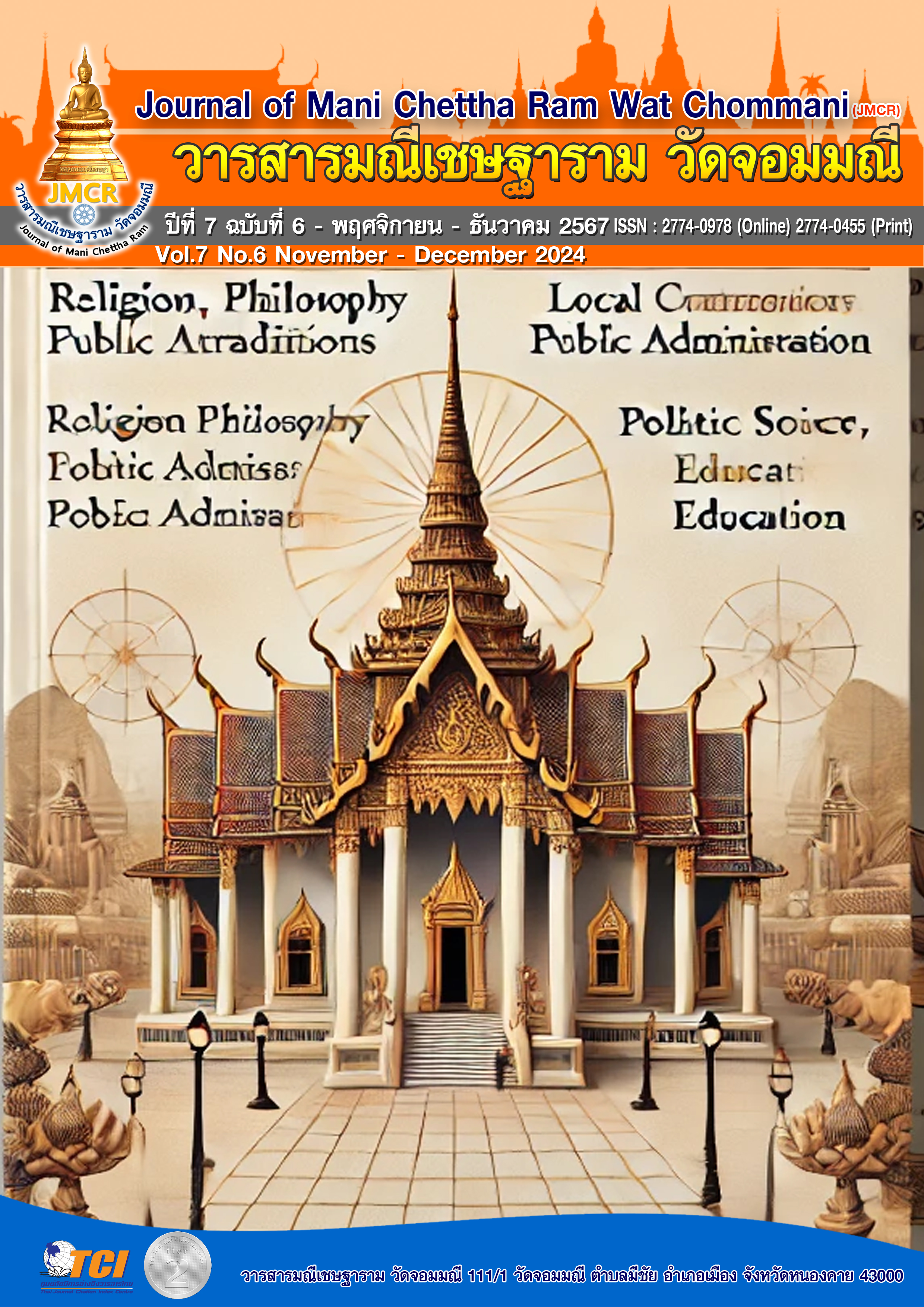THE APPLICATION OF THE FIVE PRECEPTS FOR MORAL BEHAVIOR DEVELOPMENT OF EMPLOYEES AT BUN PHRA KHUM KLAO BUDDHA CASTING FACTORY, NAKHON PATHOM PROVINCE
Keywords:
application of Buddhist principles, 5 Precepts (Sila 5), employee development, workplace moralityAbstract
This academic article aims to present the application of the Five Precepts in developing moral behavior among employees at Bun Phra Khum Klao Buddha Casting Factory in Nakhon Pathom Province. It serves as a guideline for adopting these precepts in the workplace to ensure that employees have a strong foundation in morality and ethics, fostering unity among colleagues, developing mindfulness, concentration, and responsibility in their duties, and promoting both physical and mental well-being. This leads to the most efficient and effective work performance. The results of the documentary study reveal that the outcomes of applying the Five Precepts in the workplace include employees exhibiting compassion, not harming others, avoiding corruption, maintaining appropriate relationships, communicating with honesty, and having self-discipline. These qualities contribute to creating a positive work atmosphere, building trust, and establishing relationships that lead to long-term organizational development. This results in a commendable organizational culture that supports the growth and advancement of both personnel and the organization as a whole, with good governance and responsibility towards stakeholders, society, and the environment.
The positive changes resulting from the application of the Five Precepts provide benefits in six areas: 1) sustainable growth that focuses on guaranteeing long-term organizational and economic development, 2) personal health that emphasizes maintaining physical and mental well-being through moral practices, 3) work quality that stresses achieving high standards and creating satisfaction in work outputs, 4) work efficiency that aims to increase productivity and foster good decision-making in the workplace, 5) work atmosphere that builds trust and mutual respect, and 6) family stability that focuses on creating a warm, supportive, and nurturing family environment. The application of the Five Precepts not only promotes moral behavior among employees but also positively impacts the overall development of the organization in terms of work performance, relationships between personnel, and long-term organizational sustainability.
References
จักรพันธ์ กิตตินรรัตน์. (2554). การประยุกต์หลักพุทธธรรมเพื่อการพัฒนาทรัพยากรมนุษย์. วารสารบัณฑิตศึกษาปริทรรศน์, 3(2), 33-48.
จารุวรรณ ชอบประดิถ และคณะ. (2566). การประยุกต์ใช้หลักอริยมรรคมีองค์ 8 ในการพัฒนาพนักงาน. วารสารวิจัยและพัฒนา มจร, 6(1), 59-72.
พระเจริญพงษ์ วิชัย. (2564). การพัฒนาห้องเรียนออนไลน์วิชาธรรมวิภาคสำหรับนักเรียนธรรมศึกษาชั้นตรี. วารสาร มจร พุทธปัญญาปริทรรศน์, 6(3), 177-191.
พระธรรมปิฎก (ป. อ. ปยุตฺโต). (2542). การส่งเสริมศีลธรรมในสังคมไทย. กรุงเทพมหานคร: มหาจุฬาลงกรณราชวิทยาลัย.
พระพรหมคุณาภรณ์ (ป. อ. ปยุตฺโต). (2546). ธรรมนูญชีวิต. กรุงเทพมหานคร: สำนักพิมพ์ผลิธัมม์.
พระพรหมคุณาภรณ์ (ป. อ. ปยุตฺโต). (2553). พุทธธรรม ฉบับปรับขยาย. กรุงเทพมหานคร: ผลิธัมม์.
พระพรหมคุณาภรณ์ (ป.อ. ปยุตฺโต). (2552). พจนานุกรมพุทธศาสน์ ฉบับประมวลธรรม. กรุงเทพมหานคร: ผลิธัมม์.
พระมหาเกษม สญฺญโต (ลักษณะวิลาส). (2541). ปัญหาจากการละเมิดศีลของพนักงาน. วารสารมหาจุฬาวิชาการ, 5(2), 1-15.
พระมหาสำรวย ญาณสวโร (พินดอน). (2542). หลักการดำเนินชีวิตแบบคนมีศีลธรรม. กรุงเทพมหานคร: มหาวิทยาลัยมหาจุฬาลงกรณราชวิทยาลัย.
พระสมเด็จ ฐิตธมฺโม และคณะ. (2565). การประยุกต์ใช้หลักศีล 5 ในการลดปัญหาอบายมุขในสถานประกอบการ. วารสารบัณฑิตศึกษาปริทรรศน์, 15(1), 119-132.
พระอำนาจ ปริมุตฺโต. (2553). พุทธวิธีการพัฒนาทรัพยากรมนุษย์. กรุงเทพมหานคร: มหาวิทยาลัยมหาจุฬาลงกรณราชวิทยาลัย.
พูลศักดิ์ หอมสมบัติ. (2559). พุทธวิธีการสร้างมนุษย์ทรัพยากรที่มีคุณภาพในองค์กร. วารสารมหาจุฬาวิชาการ, 3(2), 73-92.
มหาจุฬาลงกรณราชวิทยาลัย. (2539). พระไตรปิฎกภาษาไทย ฉบับมหาจุฬาลงกรณราชวิทยาลัย. กรุงเทพมหานคร: โรงพิมพ์มหาจุฬาลงกรณราชวิทยาลัย.
รัตนา ตฤษณารังสี และคณะ. (2566). การจัดการทรัพยากรมนุษย์โดยใช้หลักพุทธธรรม. วารสารบัณฑิตศึกษาปริทรรศน์, 16(1), 133-148.
วรเศรษฐ์ บัวดอก. (2564). การประยุกต์หลักศีล 5 เพื่อเสริมสร้างวัฒนธรรมองค์กร. วารสารวิจัยและพัฒนาบริหารศาสตร์, 11(1), 43-58.
สาคร หาญแท้ และคณะ. (2567). แนวทางการนำหลักศีล 5 มาใช้ในการพัฒนาพนักงาน. วารสารมหาวิทยาลัยราชภัฏนครสวรรค์, 12(2), 21-32.
สุเมธ ตันติเวชกุล. (2555). ธรรมะในหลวงกับการนำไปปรับใช้ในชีวิตประจำวัน. กรุงเทพมหานคร: มติชน.
Anthropic. (2024). Claude AI (Version 3 Opus) [Large language model]. https://claude.ai/
Napkin AI. (2024). Napkin AI (Beta). http://napkin.ai/




